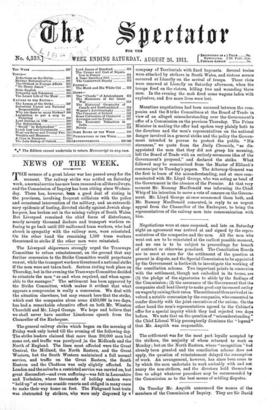The general railway strike which began on the morning of
Friday week only lasted till the evening of the following day. The strike leaders claimed that more than 200,000 men had come out, and traffic was paralyzed in the Midlands and the North of England. The lines most affected were the Great Central, the Midland, the North Eastern, and the Great Western, but the South Western maintained a full normal service, and traffic on the Great Eastern, the South Eastern and the Chatham was only slightly affected. In London and the suburbs a restricted service was carried on, but great discomfort—and even suffering—was felt in Lancashire and Yorkshire, where thousands of holiday makers were "held up" at various seaside resorts and obliged in many cases to make their way home on foot. The Fiehguard boat train was obstructed by strikers, who were only dispersed by e company of Territorials with fixed bayonets. Several trains were attacked by strikers in South Wales, and riotous scenes occurred at Llanelly on the arrival of troops. These riots were renewed at Llanelly on Saturday afternoon, when the troops fired on the rioters, killing two and wounding three men. In the evening the mob fired some wagons laden with explosives, and five more lives were lost.


































